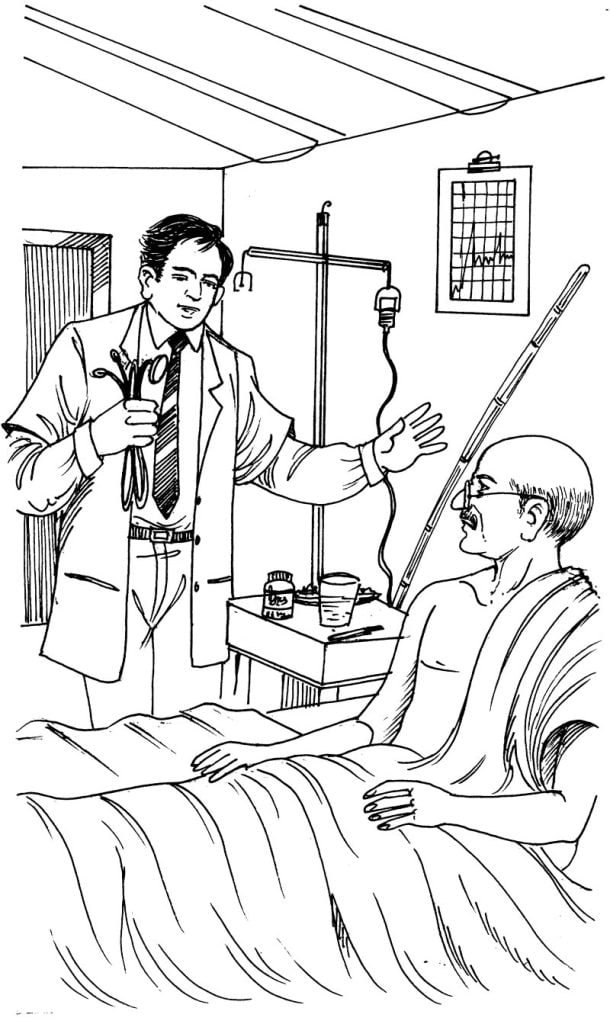In July, 1942 when the war was still being fought Congress Committee held a special meeting in Vardha. Some members wanted to help British if they promised independence.
Gandhiji opposed it.
But something was to be done for freedom. In August, 1942 Bombay hosted Congress Session. The further course of action was discussed to corner British. The talks continued till late night of 7th August and the move was finalised.
Accordingly Gandhiji gave seven day ultimatum to the Viceroy of India—‘Grant Independence to India or quit India, on 8th August.
The Congress was to start—‘Quit India’ movement asking the British to leave India in clear terms. The tone of the ultimatum angered the British. They never expected such aggressiveness from Gandhiji. The government rejected the demand.
The people rose up in ‘Do or Die’ mood. As always the administration arrested Gandhiji on the very next day and kept him under house arrest in Agha Khan Palace, Poona.
Other leaders were also arrested. But the movement continued. The police acted ruthlessly. It is not clear how many died all over the country or suffered police brutalities.
Gandhiji suffered in silence at the treatment meted out of his people. He declared 21 days fast on 10th February, 1943. His condition deteriorated. He could not move his limbs at one stage. But he refused to give up fast.

Kasturba was allowed to live with him. But she herself feel ill.
On 22nd February, 1944 Kasturba breathed her last after a long suffering by her frail body. It told upon the health of Gandhiji. It frightened the British and Gandhiji was released on 6th May. 1944.
Meanwhile, Mohammad Ali Jinnah had demanded a separate country for Muslims, Pakistan.
Lord Wavel called a meeting of Indian leaders in June, 1945 at Simla. He asked Congress to represent Hindus only while Muslim League would represent Muslims. He was trying to drive away Muslims from Congress. His plot didn’t work.
In the post-war election for British Parliament the opposition Labour Party had won that favoured independence for India.
Muslim League started igniting communal riots to demonstrate its power.
On 2nd December, 1946 Congress formed Council government under Viceroy under the premiership of Jawaharlal Nehru. Meanwhile the country suffered from the communal carnage.
Gandhiji toured Bengal and Bihar to douse communal fires and to spread message of peace.
The British government asked Indian leaders to settle differences as it was determined to withdraw from India. Lord Mountbatton came to India as the last Viceroy of India.
Jinnah wanted Pakistan and situation was such that there was no other solution than division of India. Gandhiji didn’t want the division of India.
He was a sad man.
Congress party had accepted the division. The country was divided into India and Pakistan which was followed by unprecedented communal carnage. In independent India (The independence was granted to Pakistan on 14th August, 1947 and to India on 15th August, 1947) Lord Mountbaton had agreed to stay on as the Governor General for some time. The Independence brought in its wake communal hatred and bloodshed which anguished Gandhiji. He went wherever riots were staggering to diffuse the tension. In Calcutta he sat on ‘Fast unto death’ for the stoppage of the communal carnage. The carnage stopped and both the communities promised Gandhiji that they would live in harmony.
As a result of the partition millions of Hindus fled from Pakistan to India and same number of Muslims went to Pakistan from India.
Jawahar Lal Nehru was the Prime Minister of India. It was a trying time for all.
Lacs of refugees had come to Delhi who were living in camps. The atmosphere of Delhi was poisoned with communalism.
Gandhiji kept fast to bring communal harmony. The Harijan colony where he used to stay was full of refugees. So, he was staying in Birla House.
After partition the division of the assets and cash was worked out by ‘Partition Council’. Pakistan got 20% of the properties and 17.5% of cash holdings. As New Delhi was British India’s capital, the cash was in Indian hands. As Pakistan was creating some trouble some Indian leaders wanted transfer of Pakistan’s share of cash to be delayed to reduce its mischief making capacity although it was an unethical act.
The man of principles, Mahatma Gandhi did not like this dishonest act. He asked the Indian government to pay Pakistan’s money at once. He threatened to go on hunger strike if it was not done.
The government yielded.
Some communal minded youth of little values did not like this saying it a pro-Pakistan act without fully understanding the situation. Their minds were closed to reason and the consideration for rules.

